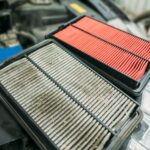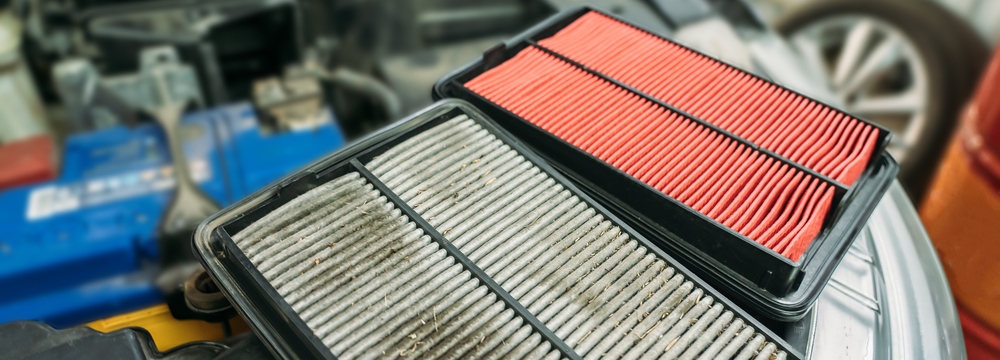 When I was a kid, I remember sitting on the stool in my dad’s garage watching him tinker on our family car every weekend. He always seemed to be doing something. Checking the tires, changing the oil, and replacing the air filter. He would point out the problems and drone on about how a good car-owner takes care of their car. That sense of responsibility stuck with me, and that’s one of the reasons why I write about car stuff. Keep reading to learn more about auto maintenance for your combustion engine car, and why airflow requires a clean engine air filter.
When I was a kid, I remember sitting on the stool in my dad’s garage watching him tinker on our family car every weekend. He always seemed to be doing something. Checking the tires, changing the oil, and replacing the air filter. He would point out the problems and drone on about how a good car-owner takes care of their car. That sense of responsibility stuck with me, and that’s one of the reasons why I write about car stuff. Keep reading to learn more about auto maintenance for your combustion engine car, and why airflow requires a clean engine air filter.
What Does An Engine Air Filter Do?
If your car has an internal combustion engine, it uses a filter to remove particulate matter from the air moving through your engine. The air filter removes contaminants like carbon, soot, pollen, dirt, leaves, bugs, and other debris. If that stuff gets inside the engine, it can severely damage the internal components. If you drive an electric vehicle (EV), you don’t need to worry – they don’t use this type of filter.
Combustion Engine: Air Filter Types
Keep your engine healthy with routine auto maintenance. The engine air filter aids your vehicle’s performance, efficiency, and reliability. Engine air filters come in different shapes and materials. You’ll find flat panels, conical, round, or radial seal engine air filters with either flexible or rigid frames. Which type of filter is best for your car? Stick with the type suggested by the auto manufacturer. Your owner’s manual will list which size and type of air filter suits your vehicle. Below is more information on each type.
Engine Air Filter Shapes
Flexible Flat Panel
These are the most commonly used types of engine air filters. A soft, flexible frame made from rubber or polyurethane encloses the flexible panel filter. This flexibility makes them easy to remove and install. However, the soft style frame is prone to damage if handled roughly. Consistent airflow and engine performance rely on proper installation. Contaminants can bypass the filter and damage the engine if the frame gets damaged during installation.
Rigid Flat Panel
These filters use a solid frame of rigid plastic and a separate gasket to maintain a consistent shape and ensure proper sealing. Rigid panel filters provide consistent performance and durability.
Conical
Older model trucks often used conical filters. They perform similarly to flexible flat panel filters, using similar materials. Installing a conical air filter can be more difficult than other shapes because the cone must sit perfectly centered in the filter housing to ensure correct airflow.
Round
Classic cars and trucks often use round engine air filters. They provide adequate filtration using various paper and cellulose materials. The round, donut shape provides an even air distribution. This shape helps older engine designs optimize the airflow as much as possible.
Radial Seal
Radial seal air filters use an efficient sealing mechanism that blocks airborne particles from entering the engine. Heavy-duty trucks and industrial vehicles often work in demanding environments where a superior seal is beneficial.
Engine Air Filter Materials
Paper
Paper air filters are the most common and affordable option. They offer good airflow and impressive filtration against dust and debris. Paper filters contain cellulose fibers, which are quite dense and one of the most functional options.
Gauze (Wet & Dry)
Gauze air filters come in two types: oiled (wet) and dry. Both types offer improved airflow, performance, and efficiency over paper/cellulose filters in ideal situations. Some automotive experts have concerns regarding filtration vs. airflow in dusty areas.
Oiled gauze filters are suffused with a synthetic oil solution that traps dirt and debris. These filters are reusable (unlike paper filters), but they require cleaning and re-oiling every 50,000 miles.
Dry gauze filters don’t use oil to obtain their excellent airflow and filtration, so their maintenance is somewhat easier. They do still require periodic removal for washing, drying, and reinstallation every 50,000 miles or so.
Foam
You can purchase aftermarket air filters that use a foam sleeve or cover over the inner particulate filter, without drastically reducing airflow. These types of filters can be helpful in chronically dusty areas, where paper or gauze filters are easily clogged. This additional protective layer is more expensive than the other options. Still, it may be more cost-effective in the long run due to fewer filter cleaning or replacement costs.
When Should I Replace My Air Filter?
Different car manufacturers suggest various replacement intervals. Most recommend replacing disposable air filters every 30,000 to 45,000 miles, depending on environmental factors and driving conditions. Severe conditions, such as very dusty environments, smoke & ash from wildfires, or an extremely high pollen count, may require a filter change every 15,000 miles.
Clean Engine Air Filter = Better Airflow
Having a clean engine air filter may not seem like a big deal, but performing this easy bit of auto maintenance can have long-term benefits. Car repairs can be expensive, so doing your part to prevent excessive wear and tear on your vehicle’s engine is wise. Below are a few benefits for your car and your wallet.
- Better gas mileage (mostly in older vehicles)
- Increased engine performance and acceleration
- Reduced chance of ignition issues (misfires, hard starts, rough idle)
Routine Auto Maintenance
Performing routine auto maintenance is one of the best ways to extend the life and performance of your vehicle. The folks at Wentworth Automotive in San Diego, CA, can help you with that. Our experienced technicians can inspect the engine air filter in your combustion engine vehicle and test its airflow rate. If the filter is dirty or clogged, we can change it for you. If there’s still life in the air filter, we will let you know that too.
Schedule Service in San Diego, CA
We look forward to seeing you! Call us at (858) 541-1044 or visit our website to make a reservation for your next auto maintenance or repair service.

